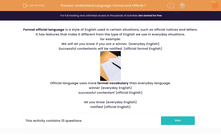Formal language is a style of English used in certain situations, such as official notices and letters. It has features that make it different from the type of English we use in everyday situations.
For example:
We will let you know if you are a winner. (everyday informal English)
Successful contestants will be notified. (formal English)

Official language uses more formal vocabulary than everyday language.
winner (everyday English)
successful contestant (formal)
let you know (everyday English)
notified (formal English)
In this activity, you will look at the differences between the two types of language.
If you are ready, we can get started!








